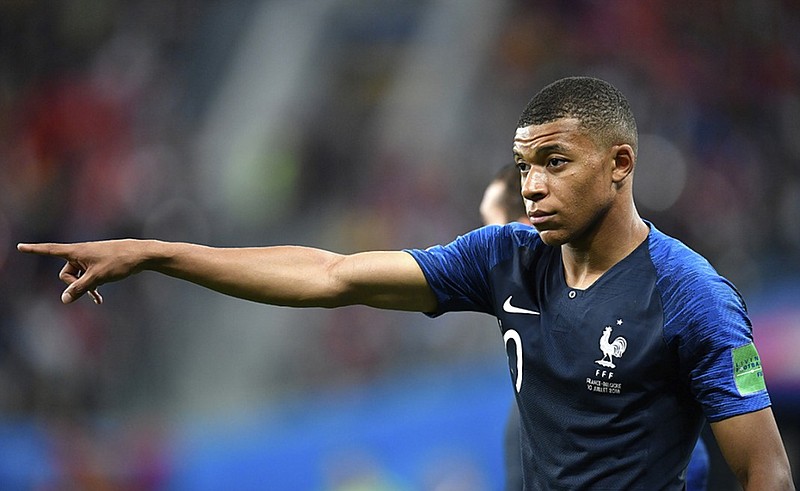MOSCOW - France's Kylian Mbappe has electrified this World Cup with speed and youthful exuberance.
Croatia's Luka Modric has coolly controlled matches in Russia with graceful play in the middle.
Whether France wins its second title in 20 years or Croatia raises the trophy for the first time Sunday at the Luzhniki Stadium - in front of Russian President Vladimir Putin and nearly a billion television viewers - could turn on the play of the two stars.
Mbappe, 19, has been the biggest sensation in this edition of soccer's quadrennial showcase, scoring three goals (including two against Argentina in the round of 16) and creating havoc for defenses with his pace and agility.
"It's going to be the biggest match of my life, for sure," said the star forward, who plays professionally for Paris Saint-Germain.
Although Mbappe has impressed at the month-long tournament that started with 32 teams, Modric has been the rock and a spark for his squad. When the 32-year-old Real Madrid midfielder has the ball at his feet, good things seem to happen for Croatia.
"Even when you think they're going to lose or going to crack, they always have the mentality to come back," Mbappe said of the Croatians. "It's a team that plays with a lot of intensity."
France last won the World Cup title in 1998, at home. The French defeated Croatia in the semifinals that year, which until now had been Croatia's best showing at the tournament.
The heads of state from both countries are expected to sit with Putin. Will Smith is set to headline the closing ceremony.
Croatia, a country of 4.5 million people that gained independence from the former Yugoslavia only 27 years ago, enters the final after playing three straight extra-time matches, including two nerve-racking penalty-kick shootouts.
In all three of those matches, Croatia has had to recover from being a goal down. The players never gave up.
"When you put the sacred Croatia shirt on, you become a different person," Croatia midfielder Ivan Rakitic said through a translator. "I'm not trying to say it's a superior feeling that the French have for France, or Russians for Russia.
"The best feeling is to be Croat these days, and this is the source of all our strength."
While Croatia had to rally to keep advancing, France won all three of its knockout games in the regulation 90 minutes and trailed for only nine of the 540-plus minutes it has been on the field in Russia.
It's a win for the continent either way. France or Croatia will become the fourth different European country to become world champion in a streak that started when Italy beat the French in the 2006 final. Spain won the 2010 title in another Europe-only final against the Netherlands, and Germany defeated Argentina in 2014 to become the first European team to win the World Cup in South America.
It will also be a financial win for both nations - though more for the victorious team. There is $10 million in extra prize money on the line in the final. FIFA will give $38 million to the winning team's national soccer federation. The runner-up gets $28 million.
The total prize fund for the 32 competing teams is $400 million, and FIFA gives each team at least $8 million.
Leading Croatia into the final is a chance for coach Zlatko Dalic to publicly appeal for some of that windfall to be reinvested to infrastructure and developing the game domestically.
"This is a huge problem," Dalic said through a translator. "I hope something may be kick-started because if not now, when? I want to highlight conditions we work in and others. We have God-given talent, character and pride, but in all other respects we are lacking.
"Many things will have to change back home, and this is an ideal opportunity for me to highlight it. Football and other sports have brought so much joy to Croatia that we must bring attention to it."
Croatia lacks a soccer venue with a capacity exceeding 35,000. Luzhniki Stadium seats 81,000. England, which Croatia beat in the semifinals at Luzhniki, plays home matches in the 90,000-seat Wembley Stadium.
"We do not have an adequate stadium to play in," Dalic said. "This is why we are a miracle. This is why we have such players who brought us joy and happiness."
While he wants to see his national program develop, for now Dalic has no problem with Croatia being the underdog one more time - or proving that label wrong.
"Tradition is there to be demolished," he said. "I'm not interested who is the opponent."
